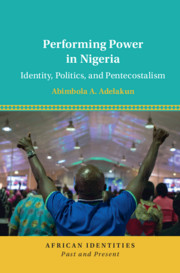Book contents
- Performing Power in Nigeria
- African Identities: Past and Present
- Performing Power in Nigeria
- Copyright page
- Dedication
- Contents
- Acknowledgments
- Introduction: Power Identity: Politics, Performance, and Nigerian Pentecostalism
- 1 Demons and Deliverance: Discourses on Pentecostal Power
- 2 “What Islamic Devils?!”: Power Struggles, Race, and Christian Transnationalism
- 3 “Touch Not Mine Anointed”: #MeToo, #ChurchToo, and the Power of “See Finish”
- 4 “Everything Christianity/the Bible Represents Is Being Attacked on the Internet!”: The Internet and Technologies of Religious Engagement
- 5 “God Too Laughs and We Can Laugh Too”: The Ambivalent Power of Comedy Performances in the Church
- 6 “The Spirit Names the Child”: Pentecostal Futurity in the Name of Jesus
- Conclusion: Power Must Change Hands: COVID-19, Power, and the Imperative of Knowledge
- Select Bibliography
- Index
3 - “Touch Not Mine Anointed”: #MeToo, #ChurchToo, and the Power of “See Finish”
- Performing Power in Nigeria
- African Identities: Past and Present
- Performing Power in Nigeria
- Copyright page
- Dedication
- Contents
- Acknowledgments
- Introduction: Power Identity: Politics, Performance, and Nigerian Pentecostalism
- 1 Demons and Deliverance: Discourses on Pentecostal Power
- 2 “What Islamic Devils?!”: Power Struggles, Race, and Christian Transnationalism
- 3 “Touch Not Mine Anointed”: #MeToo, #ChurchToo, and the Power of “See Finish”
- 4 “Everything Christianity/the Bible Represents Is Being Attacked on the Internet!”: The Internet and Technologies of Religious Engagement
- 5 “God Too Laughs and We Can Laugh Too”: The Ambivalent Power of Comedy Performances in the Church
- 6 “The Spirit Names the Child”: Pentecostal Futurity in the Name of Jesus
- Conclusion: Power Must Change Hands: COVID-19, Power, and the Imperative of Knowledge
- Select Bibliography
- Index
Summary
This chapter, “Touch not Mine Anointed”: #MeToo, #ChurchToo, and the Power of “See Finish” analyzes what could happen when the performance of power identity through the production of images is interrupted. Here, I look at how a pastor stages his power identity through visuality, and how in the wake of the global #MeToo movement, his flow of visual signs and symbols to the audience was crucially undercut by the counter-power of women’s stories. The necessity of continuously being visible and performing one’s power means the inscription of their power identity on collective psyche also facilitated a critical reception of their persona. When leaders perform power by regularly thrusting themselves or their virtual images in front of their audience, they become overexposed and that opens them up for the possibility of disposability. What followed #MeToo events also shows how people who have performed power to the point of embodying power will double down on the use of power to sustain their identity.
- Type
- Chapter
- Information
- Performing Power in NigeriaIdentity, Politics, and Pentecostalism, pp. 102 - 139Publisher: Cambridge University PressPrint publication year: 2021

